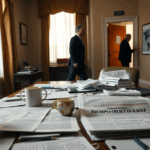Table of Contents
Understanding the Civil Forfeiture Landscape
In recent months, the issue of civil forfeiture has gained significant attention, particularly in cases involving drug-related activities. The situation surrounding Michael Driehuyzen, the landlord of a property where Canada’s largest drug superlab was discovered, exemplifies the complexities of this legal framework.
Driehuyzen asserts that he is merely a victim of circumstance, having purchased the property with legitimate earnings and without knowledge of any illicit activities taking place within it.
Civil forfeiture laws allow authorities to seize assets believed to be connected to criminal activity, even if the owner has not been convicted of a crime.
This legal approach aims to disrupt the financial incentives behind illegal operations, but it raises questions about fairness and due process, especially for property owners like Driehuyzen who claim innocence.
The Fallout from the Drug Superlab Discovery
Last October, the Royal Canadian Mounted Police (RCMP) announced the dismantling of a massive drug superlab in Falkland, B.C., leading to the seizure of an astonishing array of illegal substances and firearms.
The operation resulted in the confiscation of approximately half a tonne of hard drugs, including fentanyl, methamphetamine, and cocaine, alongside numerous firearms and cash. This high-profile case has sparked a broader conversation about the implications of drug trafficking and the responsibilities of property owners.
Driehuyzen’s legal battle highlights the tension between law enforcement objectives and the rights of individuals who may unknowingly rent their properties to tenants engaged in criminal activities. The provincial government’s attempt to seize Driehuyzen’s property, valued at nearly $1 million, raises critical questions about the balance of justice and the potential for wrongful asset forfeiture.
Legal Perspectives on Civil Forfeiture
Legal experts, such as lawyer Ravi Hira K.C., emphasize that civil forfeiture is designed to target assets linked to unlawful activities. However, the nuances of each case can complicate matters. If a property owner is unaware of criminal activities occurring on their premises, they may have grounds to retain ownership.
Yet, if they are found to have knowledge of such activities, they risk losing their property.
The case of Driehuyzen serves as a reminder of the importance of due diligence for landlords. It underscores the need for property owners to be vigilant and proactive in ensuring that their tenants are not engaging in illegal activities. As the legal landscape continues to evolve, the outcomes of such cases will likely influence future policies surrounding civil forfeiture and property rights.





